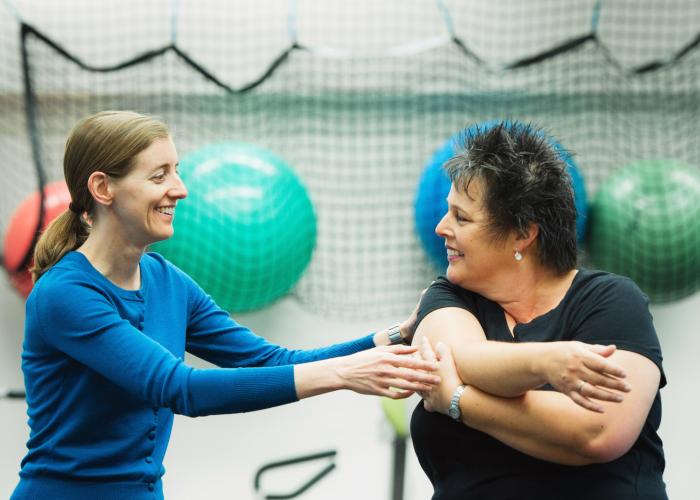
In a world-first clinical trial, a team of international researchers working with the Canadian Cancer Trials Group (CCTG) have demonstrated that a structured exercise program significantly improves survival for colon cancer patients by reducing the risk of disease recurrence and new primary cancers.
The groundbreaking seventeen-year study involved researchers from UBC’s Faculty of Medicine as well as researchers at 55 sites across Canada, Australia and the United Kingdom. It is the first of its kind to conclusively answer a long-standing question in oncology: Can physical activity improve cancer survival? The results were presented in June at the American Society of Clinical Oncology (ASCO) 2025 annual meeting and published in the New England Journal of Medicine.
The Vancouver study site was led by UBC Faculty of Medicine researchers and BC Cancer medical oncologists Dr. Sharlene Gill and Dr. Howard Lim. The site was based at BC Cancer Vancouver and was one of the largest among Canada’s 22 research sites.
“We now have the highest level of scientific evidence that structured exercise is no longer a wellness add-on — it’s a survivorship intervention with a proven survival benefit,” said study co-author Dr. Gill. “We need to integrate it as a standard care after cancer for our patients, and this means providing behavioural change support along with supervised physical activity.”
The trial results revealed a significant improvement in overall survival and disease-free survival among participants assigned to the exercise program, compared to those who only received health education materials. Patients in the structured exercise program had a 37 per cent lower risk of death and a 28 per cent lower risk of recurrence or developing other cancers.
The study integrated physical activity into post-treatment care with the guidance of a physiotherapist or kinesiologist. Each participant chose their own forms of moderate-intensity exercise with the goal of adding 2.5 hours of exercise per week.
“Currently, access to exercise support service is quite limited for people after a cancer diagnosis,” Dr. Campbell says. “The findings definitively confirm the role of exercise support to now become an essential part of clinical care for people after treatment for colon cancer. This should change access to exercise support in the future for people in Canada and internationally.”
Researchers believe these findings should affect clinical guidelines globally, positioning exercise alongside chemotherapy and surgery as standard components of care for colon cancer.
“As oncologists, one of the most common questions we are asked by patients is what else they can do to improve their outcomes,” said study co-chair, Dr. Christopher Booth, medical oncologist at Kingston Health Sciences Centre and professor of oncology at Queen’s University. “The CO21 trial provides an answer: An exercise program after surgery and chemotherapy, reduces the risk of recurrent or new cancer and improves survival, allowing patients to live longer and better lives.”
Findings 17 years in the making
CCTG CO21 CHALLENGE was a phase three randomized trial of the impact of a physical activity program on disease-free survival in patients with stage three or high-risk stage two colon cancer.
Between 2009 and 2024, the international trial enrolled 889 patients who had completed surgery and adjuvant chemotherapy for stage three or high-risk stage two colon cancer. The patients were randomly assigned to participate in a three-year structured exercise program or to receive health education materials promoting physical activity and healthy nutrition. All patients also received standard cancer surveillance and follow-up care.
Patients in the exercise program met with the exercise specialist once every two weeks to monitor progress for the first year and then monthly for two more years. The goal was to help them add 2.5 hours of aerobic exercise per week to their usual activity levels and sustain this amount of physical activity for three years.
After eight years, overall survival was 90 per cent in the structured exercise program and 83 per cent in the health education materials group.
“By bridging the gap between bold ideas and routine practice, clinical trials are essential to driving research progress that can benefit patients,” says Dr. Stuart Edmonds, executive vice president, mission, research and advocacy at the Canadian Cancer Society. “The results of this trial have the potential to save and improve lives for the tens of thousands of people in Canada affected by colorectal cancer each year, and we are proud our donors enabled us to support it.”
A version of this story was originally published on the Canadian Cancer Trials Group website.